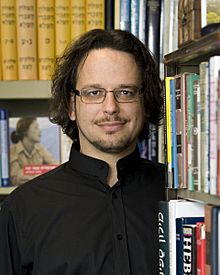Ghil'ad Zuckermann para niños
Datos para niños Ghil'ad Zuckermann |
||
|---|---|---|
 Ghil'ad Zuckermann en 2011
|
||
| Información personal | ||
| Nombre en hebreo | גלעד צוקרמן | |
| Nacimiento | 1 de junio de 1971 Guivatayim (Israel) o Tel Aviv (Israel) |
|
| Nacionalidad | Israelí | |
| Educación | ||
| Educado en |
|
|
| Información profesional | ||
| Ocupación | Lexicógrafo, lingüista, profesor universitario, revitalización lingüística, hyperpolyglot y perito judicial | |
| Área | Lingüística, contacto entre lenguas, lexicología y revitalización lingüística | |
| Cargos ocupados | Catedrático de universidad | |
| Empleador |
|
|
| Sitio web | www.professorzuckermann.com | |
Ghil'ad Zuckermann (nacido el 1 de junio de 1971 en Israel) es un lingüista muy conocido que vive en Australia. Un lingüista es una persona que estudia los idiomas y cómo funcionan. Él es profesor de Lingüística en la Universidad de Adelaida.
Contenido
¿Quién es Ghil'ad Zuckermann?
Ghil'ad Zuckermann nació en Tel Aviv, Israel. Estudió en varias universidades importantes, como la Universidad de Oxford y la Universidad de Cambridge. Obtuvo títulos avanzados en lingüística, lo que lo preparó para su carrera.
Su trabajo con los idiomas
El profesor Zuckermann se dedica a estudiar los idiomas y a ayudar a que lenguas que casi han desaparecido vuelvan a usarse. Él es el creador de un nuevo campo de estudio llamado revivalística.
¿Qué es la revitalización lingüística?
La revitalización lingüística es el proceso de hacer que un idioma que ya no se habla mucho, o que está en peligro de desaparecer, vuelva a ser usado por más personas. Es como darle una nueva vida a una lengua. El profesor Zuckermann investiga cómo lograr esto de manera efectiva.
Sus ideas sobre el hebreo moderno
Una de las ideas del profesor Zuckermann es que el hebreo moderno que se habla hoy en día debería llamarse "israelí". Él cree que este idioma es diferente del hebreo antiguo de las escrituras. Piensa que es una lengua nueva que ha evolucionado.
Publicaciones importantes
Ghil'ad Zuckermann ha escrito varios libros y artículos sobre lingüística. Sus trabajos son importantes para entender cómo los idiomas cambian y cómo se pueden recuperar.
Libros
- A Study of Multisourced Neologization (2021). Este libro trata sobre cómo se crean nuevas palabras en los idiomas.
- Israelit Safa Yafa (2008). En este libro, el profesor Zuckermann explica sus ideas sobre el hebreo moderno.
Artículos
- "Phono-Semantische Abgleichung" (2005). Este artículo explora cómo los sonidos y los significados de las palabras se relacionan.
Galería de imágenes
Véase también
 En inglés: Ghil'ad Zuckermann Facts for Kids
En inglés: Ghil'ad Zuckermann Facts for Kids


